









Municipal educational institution
Nikolaevsk Secondary School of general education
Irbeysk District
Author: Anastasia Pavlova, student of the 10th term
Krasnoyarsk Territory, Irbeysk District, hamlet of Ivanovka
Projekt leader: Galina Mikhailovna Raiswich
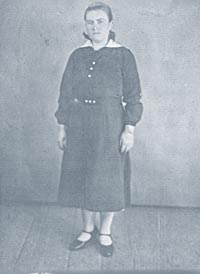
Emma Yakovlevna Dupper was born in the Moldavian SSR, in the village of
Glücksthal, Grigoropolsk District, on the 1 April 1923.
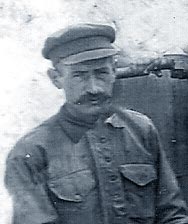
Father: Jakob Ivanovich Dupper, born 1897

Mother: Magdalina (Magdalena) Georgievna Dupper, born 1888
They were a family with many children. The mother gave birth to nine children, seven daughters and two sons. They lived in great peace and harmony. They were used to working hard and diligently. But then the number of family members decreased: a pair of twins died immediately after birth, another daughter died at the age of two. One of the brothers died when he was only thirteen: he fell off a horse and received a fatal injury. Five brothers and sisters stayed alive.
The father was working for the kolhkoz farm as a warehouseman. Inside the house there was a so-called Red Corner, where the farmers’ brigade would usually meet and hold their regular sessions, and lessons were given for all those who were not able to read and write.
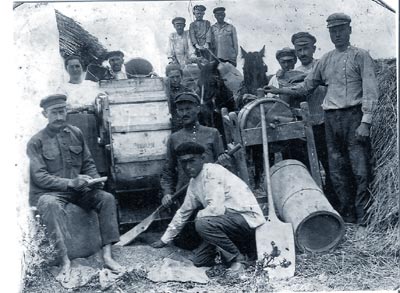
(to the very left) Jakob Ivanovich and the farmers’ brigade beside the winnowing
fan
At school she obtained very good marks in all subjects, except for Russian. In this case she knowledge was assessed as “good”. Emma Jakovlevna says: “We were taught Russian only for about an hour once a week, so that there was almost no chance to acquire a comsolidated knowledge of the Russian language. I was a very good speller; I always carefully copied everything from the blackboard and from the spelling book, without being aware of the meaning of the words and sentences concerned”. She was a pioneer, activist and member of the editorial staff, for she was good at drawing, and she used to design slogans in capital letters on the occasion of any upcoming general holiday.
1933 was a year when many people died of starvation. The village, in which grandmother lived, was not affected that much, for the village people were cultivating maize. In other villages the people suffered from a terrible famine; they roamed through the surrounding villages trying to survive by begging for alms. At that time 200 children from Samara arrived in the village. They were accomodated with childless families, because elsewise everybody would have been in fear that they might starve, as well. After a certain time, when the situation in the country had slightly improved, the children returned home; just one of the boys stayed, for he did not know where to go – his relatives had all perished from hunger.
In 1934 they got the first tractor. Grandmother says: “They brought him right in the middle of the night. What an innovation! We, the children, as well as all adults, kept running after the tractor – it looked really funny. Some time later, the very first vehicles came up in our village”. Step by step, the villagers managed to organize their life and word-day on the kolkhoz farm. Everybody did his work quietly and peacefully. Bread was available. However, the people were paid very low wages. In fulfilment of their daily work units they mainly received wheat, maite and sunflower seeds. At large, the people were compelled to pass their wheat crop to the State. In return, they were entitled to receive various goods from the stores. The Duppers were comparatively well off, they had everything they needed.
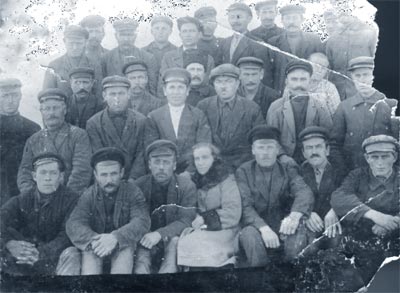
On the picture: the kolkhoz management in 1935.
chairman, controllers, book-keepers, 11 members of the farm worker brigade,
1 brigadier responsible for the cultivation of tobacco, 1 brigadier in charge of
winegrowing,
1 working for the market garding department, 1 for stock-breeding.
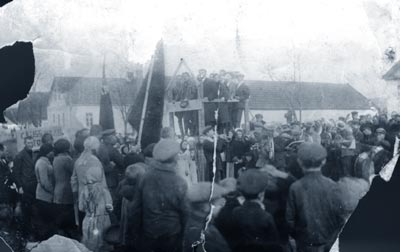
October demonstration 1935. The event was organized by the presidium of the
kolkhoz farm, where grandmother’s schoolmistress gave lessons at the basic
school.
On the 23 February 1937, right in the middle of the night, somebody was knocking at the window shouting: “Jakob, open the door!” – This very night the arrested 24 individuals altogether, and they were all fathers of a family. Before the official arrest their houses were subject to searching and a strict inspection. In their case everything turned out to be okay – there were neither any missing amounts nor any surplus. One week later, however, they came again to arrest him, as well. Father was taken to the prison in Tiraspol. In March they accepted to receive a parcel in his name; two weeks after this first delivery, he obviously ceased to exist there, for this time they refused to take the packet – without any explanation. All they said was: “This person does not exist here!” – They neither gave any information about what had become of him, nor where they had taken him.Till this day he is missing.
Emma Jakovlevna had to leave school, but succeeded to finish seven classes. The schoolmaster appeared at home, asking her mother to allow her to continue attending school. But the mother replied: “Someone has to work for a living, for just a little piece of bread!” – The mother was unable to accept a job, for her daughter Lisa was handicapped. She was Jakob’s elder daughter, all the others were younger.
Grandmother began to work at the age of 13 – and she had to fulfil the same tasks as an adult.
22 of June 1941. Grandma recalls: “I had left for the millet field with the other girls to do the weeding; every single halm had to be pulled out by hand. We were forced to spen all day on our knees. In the evening, when we were on our way back home, we noticed a man, who was carrying a big bell with him. He stopped from time to time telling the people to gather for an urgent meeting”. When everybody had arrived the brigadier said: “ By tomorrow morning, at dawn, you must get ready to leave this place. Go and get your shovels, pack some foodstuffs and then form up your brigade; the war broke out – trenches have to be excavated”.
Grandma continues: “The very thought of it was horrible. The grain was all ripe. We expected a rich grain harvest. As soon as the day broke, they all set off for Grigoropol – childless women, young fellows, girls, men. This is where the Dnyestr flows, and they forced us to dig out trenches, 6 m wide, all along the river; on one side they were supposed to be 1,2 meters deep, on the other – 2,5 meters, so that tanks would get easily into the trench but then have no chance to get our anymore”. Grandmother says: “Our tanks were bound to the front, they were moving on day and night, and there were so many of them”.
In 1943 grandma was administered the sacrament of confirmation. The corresponding document still exists.
 Confirmation certificate
Confirmation certificate
Emma Dupper
Born on the 01.04.1923 in Glücksthal
Baptized on the 08.04.1923 in Glücksthal
Confirmed on the 07.02.1943 after schooling in Christianity.
Chaplain
Signature
Adolf Brukner (Bruckner)
rgyman of the Protestand Church in Roismarkt
(Tranylvania).
Stamp: Land Consistory of the Protestant Church
in Romania
On the 18 March 1944 they issued the command to “Leave the settlement and pack up as much as you will be able to take along!” – They packed up as many belongings as possible, everything that would fit on the cart – foodstuffs, clothings; but, in actual fact, it was not much, for they still had to place the handicapped sister, granmother’s mother and the three smallest children on the cart. At the very end of the action they fastened their cow to the cart. They were compelled to leave a well-filled wine cellar as well as aplenty of wheat and maize on the attic behind. Nobody wanted to leave his home. But they had no choice; they were not allowed to stay: “Whoever refuses to go, will be executed!”. Thus, the people left all in a huge treck. They were instructed about how to get to Bessarabia. Those who were able to move their legs went on foot, such as grandma. They marched through Bessarabia and Romania., Bulgaria, Yugoslavia and Hungary.
During their stay in Bessarabia they sold the cow, for it was very painful for the animal to walk all the time. In Hungary, in the city of Budapest, they were asked to board a train – fright cars, which were normally used for the transportation of cattle; there they had to leave their horses and carts behind.
The train took them to Poland, up to a place called Pabianits. They found accomodation in a school building and were reached out some administrative document.
 Identification
Identification
For Black Sea Germans
Surname: Dupper^, Name: Emilia
Born: 01.04.1923 … in …
Place of residence: ……..
Where: ………………
Enregistered with her parents:
Magdalena Dupper
Passport N° 71275
Registered with the: Reich Commissar for the Strengthening of German Ethnicity
as resettler, hamlet of Lask
This temporary document will be in force, until it has been replaced by a true
passport
The townspeople are requested to administer to the bearers unconditionally.
Pabianits, 1.6.1944
Stamp. Administrator’s signature
The Dupper family found accomodation in the premises of School N° 6. Three families lived there in one classroom until the 10 July. Afterwards the people were assigned to live in different villages. The family got to the village of Kartsevo, Lask District. The Duppers and the Brazels happened to get to a landowner called Schnaider. They started to work for him, helped with the threshing and potatoe harvest.
Upon their arrival, sister Lida was immediately taken to a childrens’ home. They lived with the landowner until the 22 December; then they were sent to the settlement of Waltgammer, Wollstein (Wolsztyn) District, where they were assigned a little wooden house; it was all built from trunks and had a thatched roof. Eight persons, two families, were to find themselves a living space in just two rooms. They were working for a landowner called Wais (Weiss). She milked the cows and cooked potatoes to feed the pigs. They did not receive any wages, although they had to do physically hard and dirty labour.
She died there on the 10 Novemver 1944; they received a document confirming that they would come and fetch her corpse away, but they did not have the chance to bury her, for the whole area was under bombardment, and they did not succeed to pave the way up to the home for invalids, which was situated in another hamlet.
On the 22 January 1945 the front extended just throught this village, the Red Army was marching in.
On the 16 February the Soviet government sent all women without little children and men to Germany, where they were supposed to dig out trenches; a second front was opened. Eleven individuals from their village were affected by this order, all women, with the exception of one man – the husband of grandmother’s sister. They were digging trenches till the 15 March, slept in houses which the owners had abandonned. Polish women cooked the meals for them. The Poles wore a red piece of ribbon sewn on their clothes; the Germans were supposed to use the letter “G” instead - to be sewn to the front part, as well. Grandmother, however, refused to do that, for she regarded herself as a Russian German. Her son-in-law also refused to sew any distinctive mark on his clothings, but the others were afraid to get punished in case they did not comply with the measure. On the 16 March they finally returned to their family, ti the little wooden hut. That very night, Red Armists and Polish soldiers came for the son-in-law without giving them any information about where they would take him to. Many years later they learned that he was compelled to do hard labour in the trud army.
On the 22 April Emma Jakovlevna was sent to a plce called Kepnits (?) to take care of the horses. Grandmother stayed there until the 11 June 1945. One day her younger sister Frieda, born in 1930, said: “They are going to send us home!” – In order that they let her leave, she went to see the chief of staff, telling him that they would soon send her home, but that her mother would not go without her daughter. The commander replied: Listen, girl, you won’t get home. They intend to take you to Siberia!” – However, grandmother said: “I rather go to Siberia than stay here in Poland, even if I have to nourish on black bread and water! But I do not want to stay in this foreign country”. The commander issued a document confirming that grandmother was excempted from labour and permitted to leave. Unfortunately, this document got lost in the post-war confusion.
On the 14 June 1945 they were all taken to the train station and asked to get on a train with open waggons, loaded with destroyed weaponry. The people were to travel with dangerous weapons around. They were taken up to Brest, where they had to change on freight cars used for the transportation of cattle. Many people did not survice the stresses and strains. Mainly children and old people died during the trip; they were buried, whenever the train stopped at a station. They were supplied with dry rations; when the train stopped, those who were quick enough, managed to fetch some hot water, others missed the train and stayed back at the station. In Brest they were told the exact place of their final destination.
On the 15 August the reached the train station of Atbazar in Kazakhstan. Six families were asked to get off the train, the others continued their trip. In Atbazar, far and wide, there was not a single place where to accommodate them. To pick up the people from the station the authorities had sent two carts with harnessed oxes, as well as one harnessed horse team. The seven members of the Dupper family went by horse. Among the resettlers was a handicapped woman with two children, her sister was an invalid, too. Another family consisted of a woman with six little children standing in a row from the tallest to the shortest. There was another woman with four children and a family made up of a woman with two children and her sister. On the 17 August 1945 they finally reached the Akmolinsk Region, Zhuravliovsk District, hamlet of Novodonetskoe.
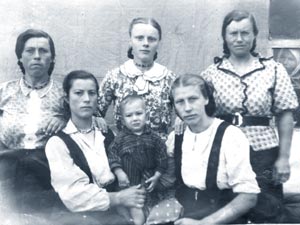
1951. Milkmaids. Emma Jakovlevna worked as a milkmaid.

1955. Farm administrator, livestock technician, milkmaids, caretaker and
inspector.
On the 20 June 1956 grandmother got married to Mikhail Yakovlevich Zinovev and adopted his surname.

She gave birth to seven children. Five stayed alive. When her eldest son came to
school, they
jointly learned Russian, particularly how to read and write fluently.
Later Emma Yakovlevna Zinoveva was honoured by the “Maternity Medal” (1st class).